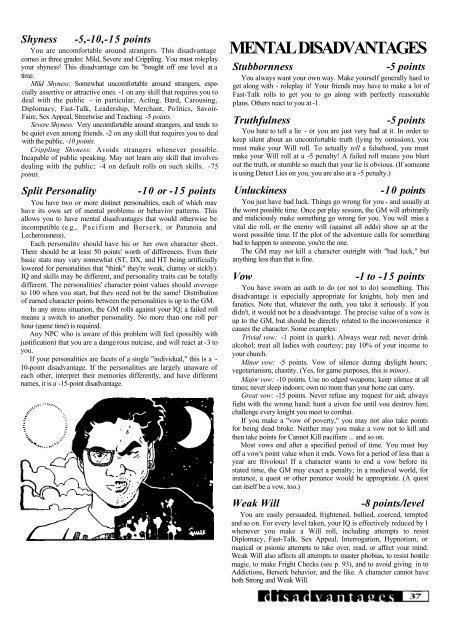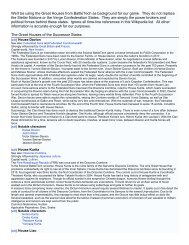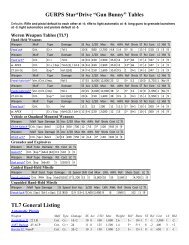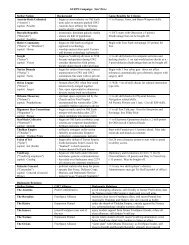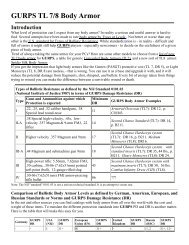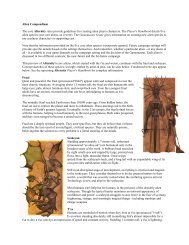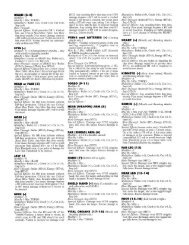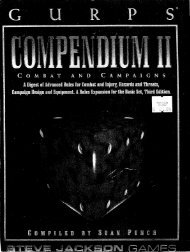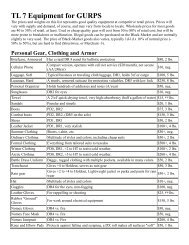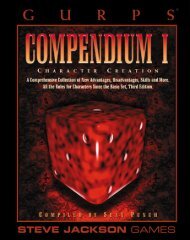Shyness-5,-10,-15 pointsYou are uncomfortable around strangers. This disadvantagecomes in three grades: Mild, Severe and Crippling. You must roleplayyour shyness! This disadvantage can be "bought off one level at atime.Mild Shyness: Somewhat uncomfortable around strangers, especiallyassertive or attractive ones. -1 on any skill that requires you todeal with the public - in particular, Acting, Bard, Carousing,Diplomacy, Fast-Talk, Leadership, Merchant, Politics, Savoir-Faire, Sex Appeal, Streetwise and Teaching. -5 points.Severe Shyness: Very uncomfortable around strangers, and tends tobe quiet even among friends. -2 on any skill that requires you to dealwith the public. -10 points.Crippling Shyness: Avoids strangers whenever possible.Incapable of public speaking. May not learn any skill that involvesdealing with the public; -4 on default rolls on such skills. -75points.Split Personality-10 or -15 pointsYou have two or more distinct personalities, each of which mayhave its own set of mental problems or behavior patterns. Thisallows you to have mental disadvantages that would otherwise beincompatible (e.g., Pacifism and Berserk, or Paranoia andLecherousness).Each personality should have his or her own character sheet.There should be at least 50 points' worth of differences. Even theirbasic stats may vary somewhat (ST, DX, and HT being artificiallylowered for personalities that "think" they're weak, clumsy or sickly).IQ and skills may be different, and personality traits can be totallydifferent. The personalities' character point values should averageto 100 when you start, but they need not be the same! Distributionof earned character points between the personalities is up to the GM.In any stress situation, the GM rolls against your IQ; a failed rollmeans a switch to another personality. No more than one roll perhour (game time) is required.Any NPC who is aware of this problem will feel (possibly withjustification) that you are a dange rous nutcase, and will react at -3 toyou.If your personalities are facets of a single "individual," this is a -10-point disadvantage. If the personalities are largely unaware ofeach other, interpret their memories differently, and have differentnames, it is a -15-point disadvantage.MENTAL DISADVANTAGESStubbornness-5 pointsYou always want your own way. Make yourself generally hard toget along with - roleplay it! Your friends may have to make a lot ofFast-Talk rolls to get you to go along with perfectly reasonableplans. Others react to you at -1.Truthfulness-5 pointsYou hate to tell a lie - or you are just very bad at it. In order tokeep silent about an uncomfortable truth (lying by omission), youmust make your Will roll. To actually tell a falsehood, you mustmake your Will roll at a -5 penalty! A failed roll means you blurtout the truth, or stumble so much that your lie is obvious. (If someoneis using Detect Lies on you, you are also at a -5 penalty.)Unluckiness-10 pointsYou just have bad luck. Things go wrong for you - and usually atthe worst possible time. Once per play session, the GM will arbitrarilyand maliciously make something go wrong for you. You will miss avital die roll, or the enemy will (against all odds) show up at theworst possible time. If the plot of the adventure calls for somethingbad to happen to someone, you're the one.The GM may not kill a character outright with "bad luck," butanything less than that is fine.Vow-1 to -15 pointsYou have sworn an oath to do (or not to do) something. Thisdisadvantage is especially appropriate for knights, holy men andfanatics. Note that, whatever the oath, you take it seriously. If youdidn't, it would not be a disadvantage. The precise value of a vow isup to the GM, but should be directly related to the inconvenience itcauses the character. Some examples:Trivial vow: -1 point (a quirk). Always wear red; never drinkalcohol; treat all ladies with courtesy; pay 10% of your income toyour church.Minor vow: -5 points. Vow of silence during daylight hours;vegetarianism; chastity. (Yes, for game purposes, this is minor).Major vow: -10 points. Use no edged weapons; keep silence at alltimes; never sleep indoors; own no more than your horse can carry.Great vow: -15 points. Never refuse any request for aid; alwaysfight with the wrong hand; hunt a given foe until you destroy him;challenge every knight you meet to combat.If you make a "vow of poverty," you may not also take pointsfor being dead broke. Neither may you make a vow not to kill andthen take points for Cannot Kill pacifism ... and so on.Most vows end after a specified period of time. You must buyoff a vow's point value when it ends. Vows for a period of less than ayear are frivolous! If a character wants to end a vow before itsstated time, the GM may exact a penalty; in a medieval world, forinstance, a quest or other penance would be appropriate. (A questcan itself be a vow, too.)Weak Will-8 points/levelYou are easily persuaded, frightened, bullied, coerced, temptedand so on. For every level taken, your IQ is effectively reduced by 1whenever you make a Will roll, including attempts to resistDiplomacy, Fast-Talk, Sex Appeal, Interrogation, Hypnotism, ormagical or psionic attempts to take over, read, or affect your mind.Weak Will also affects all attempts to master phobias, to resist hostilemagic, to make Fright Checks (see p. 93), and to avoid giving in toAddictions, Berserk behavior, and the like. A character cannot haveboth Strong and Weak Will.
DEPENDENTSA dep endent is a non-player character for whom you areresponsible - e.g., your child, younger brother or spouse.Dependents can be a problem: you have to take care of them, andyour foes can strike at you through them! Therefore, a dependent is adisadvantage, worth negative character points. The point value of adependent is set by his or her competence, importance in your life,and frequency of appearance, as shown below.The GM may restrict the dependents allowed in a campaign, oreven forbid them entirely, if they would unduly disrupt the flow ofthe adventure.Competence of DependentThe dependent is created just like any other character, butinstead of the 100 points used to create a player character, you use 50points or less. The more character points you use to "build" yourdependents, the more competent they will be and the fewer pointsthey will be worth as a bonus to you.A dependent built with over 50 points is not helpless enough tobe worth any bonus points. Indeed, a "dependent" built on 51-75points may be capable enough to be helpful... in essence, an Ally(p. 23) who costs no character points. The only drawback to such a"competent dependent" is that you must still look after him or her.Dependent built with 26-50 points: Slightly more competentthan average. -6 points.Dependent built with 1-25 points: Average. -12 points.Dependent built with 0 or fewer points: Possibly a young childor feeble older person. -16 points.Importance of DependentThe more important the dependent is to you, the more you multiplyhis or her intrinsic "nuisance value" and worth in points.Employer or acquaintance: You feel a responsibility toward thisperson, but you may weigh risks to them in a rational fashion. Usehalf the listed value.Friend: You must always try to protect this person; you mayonly risk harm to him or her if something very important (such asthe safety of many other people) is at stake. Use the listed value.Loved one: The dependent is a relative or lover. You may not putanything before the safety of this dependent. Double the listed value.Frequency of AppearanceThe more often a dependent shows up, the more bonus points he isworth. Pick a frequency of appearance that fits the "story" behind thedependent. If the dependent is your infant child, for instance, itwould be odd for him to appear "quite rarely"!Dependent appears almost all the time (roll of 15 or less): triplethe listed value.Dependent appears quite often (roll of 12 or less): double thelisted value.Dependent appears fairly often (roll of 9 or less): use the listedvalue.Dependent appears quite rarely (roll of 6 or less): use half thelisted value.Example: Marshal Jack O'Rourke is in love with the town'spretty schoolmarm. She is a better-than-average character, createdwith 50 points (a 6-point bonus for O'Rourke). He is in love withher (double her value to 12). And she's around almost all the time(triple her value to 36). The net result: -36 character points forMarshal Jack. But he'll spend a lot of his time rescuing that schoolmarmfrom rustlers, Indians and train robbers.If your dependent is kidnapped or otherwise mislaid during play,you must go to the rescue as soon as you can. (If a powerful enemyand a dependent are both "rolled up" at the beginning of an adventure,the GM can start off by letting the enemy kidnap the dependent andgo on from there!) If your dependent is in trouble and you don't go tohis aid immediately, the GM can deny you bonus character points for"acting out of character." Furthermore, you can never get anycharacter points for a play session in which your dependent is killedor badly hurt. So ... if you have dependents, take good care ofthem!If your dependent is lost (killed, or so seriously injured that theGM decides he is effectively out of the campaign), you must makeup the bonus points you got for them. There are three ways to dothis: "buy off the amount by spending points earned during youradventures, take a new disadvantage, or get a new dependent. Newdependents are usually inappropriate, but a mental disabilitybrought on by the loss is a good solution. (Ever since the octopusgot Amy, you've been afraid of the ocean . . .)No character may ever earn points for more than two dependents atonce. However, GMs may interpret this rule creatively. Forinstance, a crimefighter who is a schoolteacher in his mundaneidentity could have "generic dependents" - all pupils. They areyoung (12 points) and around quite often (double value, for 24points each). They count only as "friends" - but, even so, the twodependentlimit allows that character 48 points' worth of dependents.(And if one gets hurt, there will always be others.)Some good dependents . . . For anyone: elderly relatives, teachers,friends, children, young brothers or sisters, lovers, husbands, orwives. For crimefighters: young sidekicks, reporters, or wards. Forwizards: apprentices. For ship captains (ocean- or space-going):ensigns or cabin boys. For soldiers: orphans, new recruits. Forcriminals or mad scientists: incompetent henchmen.
- Page 3 and 4: 17. FLIGHT.........................
- Page 5 and 6: Materials Needed for PlayThe GURPS
- Page 7 and 8: WHAT IS ROLEPLAYING?A roleplaying g
- Page 9 and 10: Character TypesThere are no "charac
- Page 12 and 13: Four numbers called "attributes" ar
- Page 14 and 15: You are free to set the physical ap
- Page 16 and 17: REPUTATIONSome characters are so we
- Page 18 and 19: These are character traits that are
- Page 20 and 21: Legal Enforcement Powers 5, 10 or 1
- Page 22 and 23: Rapid Healing5 pointsThis advantage
- Page 24 and 25: A minor deity as Patron to a travel
- Page 26 and 27: ReputationVariable (see p. 17)Socia
- Page 28 and 29: Lame-15,-25, or -35 pointsYou have
- Page 30 and 31: Bad Temper-10 pointsYou are not in
- Page 32 and 33: Dyslexia-5 or -15 pointsYou have a
- Page 34 and 35: Pacifism-15 or -30 pointsYou are op
- Page 38 and 39: You have a significant responsibili
- Page 40 and 41: A "quirk" is a minor personality tr
- Page 42 and 43: SpecializingRequired Specialization
- Page 44 and 45: MEANING OF SKILL LEVELSSo you have
- Page 46 and 47: Teamster (Mental/Average)Defaults t
- Page 48 and 49: Skiing (Physical/Hard)Defaults to D
- Page 50 and 51: Guns/TL (Physical/Easy)Defaults to
- Page 52 and 53: Any of these skills can be self-tau
- Page 54 and 55: Levels of Language SkillThis table
- Page 56 and 57: Most outdoor skills can be learned
- Page 58 and 59: PSIONIC SKILLSThese are special men
- Page 60 and 61: Forensics/TL (Mental/Hard)Defaults
- Page 62 and 63: Few Hundred Acres: Knowledge of far
- Page 64 and 65: Many skills in this category are ta
- Page 66 and 67: Lockpicking/TL (Mental/Average) Def
- Page 68 and 69: Gunner/TL See Combat Skills, p. 50M
- Page 70 and 71: Now you need to decide what equipme
- Page 72 and 73: Each suit of "real" armor includes
- Page 74 and 75: Listing Weapons On Your Character S
- Page 76 and 77: Recording Encumbrance on YourCharac
- Page 78 and 79: Passive Defense. The first blank is
- Page 80 and 81: The longer (and the more skillfully
- Page 82 and 83: When you improve a skill, the cost
- Page 84 and 85: Not all the advantages and disadvan
- Page 86 and 87:
But remember . . . some skills have
- Page 88 and 89:
ClimbingTo climb anything more diff
- Page 90 and 91:
SwimmingThe Swimming skill (p. 49)
- Page 92 and 93:
WILL ROLLSWhen a character is faced
- Page 94 and 95:
The GURPS combat system is designed
- Page 96 and 97:
WaitDo nothing unless a foe comes w
- Page 98 and 99:
You may only block one attack per t
- Page 100 and 101:
Missile WeaponsMissile weapons are
- Page 102 and 103:
At the end of your move, if you hav
- Page 104 and 105:
The rules for attacking a foe are e
- Page 106 and 107:
tell you how long it will take. In
- Page 108 and 109:
You may normally parry only one att
- Page 110 and 111:
CLOSE COMBATUsing the Move, Step an
- Page 112 and 113:
(adjusted) ST! Note that a shield h
- Page 114 and 115:
Ranged Weapon StatsFor each ranged
- Page 116 and 117:
second. On the table, this rounds u
- Page 118 and 119:
If you are using the "hit location"
- Page 120 and 121:
Removing or folding the stock of a
- Page 122 and 123:
After the initial "freeze" ends, ea
- Page 124 and 125:
ATTACKING INANIMATE OBJECTSThere ar
- Page 126 and 127:
This subtraction will mostoften aff
- Page 128 and 129:
Psionic healing (p. 175) and magica
- Page 130 and 131:
DrowningSee the rules for Swimming,
- Page 132 and 133:
protects completely. Toughness prot
- Page 134 and 135:
Resolving mounted or vehicular comb
- Page 136 and 137:
Using Ranged Weapons From Horseback
- Page 138 and 139:
This section covers special rules f
- Page 140 and 141:
HT: Health and Hit PointsFor a roug
- Page 142 and 143:
Swarm AttacksA group of small creat
- Page 144 and 145:
Encumbrance and MovementEncumbrance
- Page 146 and 147:
A critical miss means the energy co
- Page 148 and 149:
oll will not end the spell, but the
- Page 150 and 151:
If the subject makes the resistance
- Page 152 and 153:
won't work. If anyone but the caste
- Page 154 and 155:
ANIMAL SPELLSThese are the spells r
- Page 156 and 157:
If the summoning spell is repeated,
- Page 158 and 159:
Cost: 1 for an object up to the siz
- Page 160 and 161:
Armor EnchantmentsThese spells work
- Page 162 and 163:
AuraInformationShows the caster a g
- Page 164 and 165:
Psionics, or "psi" abilities, are p
- Page 167 and 168:
GlossaryESP - Extra-Sensory Percept
- Page 169 and 170:
Psionics and MagicMagic and psionic
- Page 171 and 172:
PSYCHOKINESISThis power covers movi
- Page 173 and 174:
Pside EffectsPsi skills can have "s
- Page 175 and 176:
Limitations(Continued)Fickle: varia
- Page 177 and 178:
Player-Made MapsWhenever the player
- Page 179 and 180:
Predetermined ReactionsCertain NPCs
- Page 181 and 182:
Dealing with the PlayersArgumentsAs
- Page 183 and 184:
Time Use SheetsThe Time Use Sheet (
- Page 185 and 186:
Weapons and Armor0. Fists and stone
- Page 187 and 188:
Weather(Continued)WindWinds from ga
- Page 189 and 190:
Gold and SilverA traditional assump
- Page 191 and 192:
JobsThe jobs available in each game
- Page 193 and 194:
Job (Prerequisites), Monthly Income
- Page 195 and 196:
Sooner or later, every GM wants to
- Page 197 and 198:
Features of a GoodAdventureA good a
- Page 199 and 200:
World-BuildingA game world is a com
- Page 201 and 202:
CRITICAL HIT TABLEAll doublings or
- Page 203 and 204:
When the players meet an NPC whose
- Page 205 and 206:
Weapons are listed in groups, accor
- Page 207 and 208:
MODERN AND ULTRA-TECH WEAPONSWeapon
- Page 209 and 210:
ANCIENT/MEDIEVAL ARMORUse this tabl
- Page 211 and 212:
FANTASY/MEDIEVAL EQUIPMENTThe follo
- Page 231 and 232:
After eight printings of the GURPS
- Page 233 and 234:
of Divination should match the "fla
- Page 235 and 236:
Minor disadvantage: -5 points. Agai
- Page 237 and 238:
Whether through an accident of birt
- Page 239 and 240:
Note that this disadvantage is inco
- Page 241 and 242:
SKILLSARTISTIC SKILLSVideo Producti
- Page 243 and 244:
traders, and chess-like games are c
- Page 245 and 246:
If, during an adventure, a philosop
- Page 247 and 248:
VITAL ORGANSThese are optional rule
- Page 256 and 257:
INSTANT CHARACTERSThis quick refere


